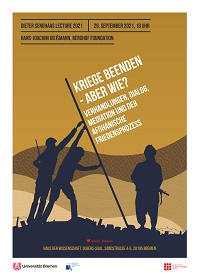Dieter-Senghaas-Lectures
With its annual lecture series on European and world political developments, crises and conflicts, the Institute for Intercultural and International Studies pays tribute to its Senior Fellow Prof. Dr. Dr. h.c. Dieter Senghaas, who is not only one of the founding fathers of the Institute, but also one of the most internationally renowned and renowned peace and conflict researchers. In 2015, the lecture series was opened by Prof. Klaus Dieter Wolf, Executive Member of the Board of the Hessian Foundation for Peace and Conflict Research, in the historic "Stadtwaage".
2021: Kriege beenden - aber wie? Verhandlungen, Dialog, Mediation und der afghanische Friedensprozess
2019: Prof. Dr. Birgit Mahnkopf: Der Krieg gegen den Planeten und die Perspektiven von Weltordnungspolitik an Kipppunkten der menschlichen Entwicklung
2018: Prof. Dr. Dr. h.c. Hans Joas: Postnationaler Imperialismus? Eine militaristische Denktradition und ihre gegenwärtige Bedeutung
2017: Prof. Dr. Dr. h.c. Gudrun Krämer: Einheit, Vielfalt. Differenz. Vom Umgang mit dem Anderen im zeitgenössischen Islam
 Poster Dieter-Senghaas-Lecture 2021
Poster Dieter-Senghaas-Lecture 20212021: Kriege beenden - aber wie? Verhandlungen, Dialog, Mediation und der afghanische Friedensprozess
Wednesday, September 29, the 6th Dieter Senghaas Lecture will take place at 18:00 in the Olbers-Saal at Bremen's Haus der Wissenschaft (6 pm), to which all interested people are cordially invited.
The violent conflicts of the last decades pose enormous challenges to established actors and organizations in international politics. They are proving to be increasingly intricate and tenacious, they manifest themselves in multiple dimensions and rarely have clear fronts. As a result, they usually overtax the systemic problem-solving capabilities of the international community, especially since they can hardly be contained at the national level and quickly contribute to regional and international escalations. Therefore, the question of how wars can be ended under the conditions of globalized politics remains of unbroken relevance. Diplomatic negotiations continue to be seen as an effective means of regulating and resolving military conflicts. However, it is becoming increasingly apparent that their yield in settling systemic conflicts is rarely lasting. Therefore, approaches of dialogue and mediation have been conceived and developed in the recent past as alternatives or complements to negotiations. This presentation focuses on the Afghan peace process, in which all three approaches have been equally effective and in which the Berghof Foundation has been involved for many years. It combines conceptual considerations with practical experience and thus provides important insights into which ideas and practices of conflict resolution can be materially implemented in today's world.
Prof. Dr. Hans-Joachim Gießmann is director emeritus of the Berghof Foundation, where he is senior advisor to the Afghanistan and Central/South Asia Unit.
With this lecture series, the Institute for Intercultural and International Studies (InIIS) and the Landeszentrale für Politische Bildung Bremen pay tribute to the life and work of the internationally renowned peace and conflict researcher Dieter Senghaas, who has taught at the University of Bremen since 1978 and is a co-founder of InIIS. With the "civilizational hexagon", which focuses on the possibilities of peaceful development in and between societies, he created a paradigm that has made it into German students' high school graduation assignments and into the most important textbooks on international relations. His book "The Clash within Civilisations. Coming to Terms with Cultural Conflicts," has been translated into numerous languages, including Chinese, Arabic, and Korean. His body of work includes 35 books authored by him, as well as 35 other books in which he has participated as editor or co-author.
You can download the poster here (jpg).

